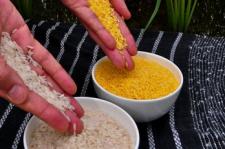Philippines approves GMO golden rice for commercial production
By Staff,
GMWatch
| 07. 23. 2021
No independent health risk assessment was done; Farmer-scientist group MASIPAG condemns decision
The Philippines has approved GMO golden rice for commercial production. This is in spite of the fact that no independent data on the safety of this GMO for health and the environment have been published; that beta-carotene, which the rice is engineered to contain, is one of the commonest molecules in nature and numerous native plants contain high levels; and that the US FDA says that GMO golden rice doesn't contain enough beta-carotene to justify a health claim.
As Glenn Davis Stone and Dominic Glover point out, it is still unknown if the beta-carotene in GMO golden rice can even be converted to Vitamin A in the bodies of badly undernourished children. In addition, research shows that what beta-carotene there is in the rice degrades rapidly in storage. Cooking further degrades the beta-carotene.
Meanwhile, as the development of golden rice creeps along, the Philippines has managed to slash the incidence of Vitamin A deficiency by non-GMO methods.
The author of the France24 article below is clearly ignorant of these crucial facts.
1. Philippines approves GMO 'golden rice'...
Related Articles
By Liyan Qi and Jonathan Cheng, The Wall Street Journal | 03.26.2025
photo via Wikimedia Commons licensed under CC by 3.0
Chinese scientist He Jiankui set off global outrage and landed in prison after he skirted ethical guidelines and claimed he had produced genetically modified babies designed to resist HIV infection.
Now, the self-styled ...
By Luis Prada, Vice | 03.14.2025
public domain photo by Voice of America via Wikimedia Commons
Back in 2019, Chinese biophysicist He Jiankui proudly announced to the world that he had created two genetically edited human babies, fully expecting a round of applause and three cheers...
By Nick Cumming-Bruce, New York Times | 03.13.2025
A United Nations commission on Thursday accused Israel of targeting hospitals and other health facilities in Gaza that provide reproductive services, including an I.V.F. clinic where thousands of embryos were destroyed, in what it called an effort to prevent Palestinian...
By Craig S. Smith, Forbes | 03.08.2025
One recent evening in Shenzhen, a group of software engineers gathered in a dimly lit co-working space, furiously typing as they monitored the performance of a new AI system. The air was electric, thick with the hum of servers and...




